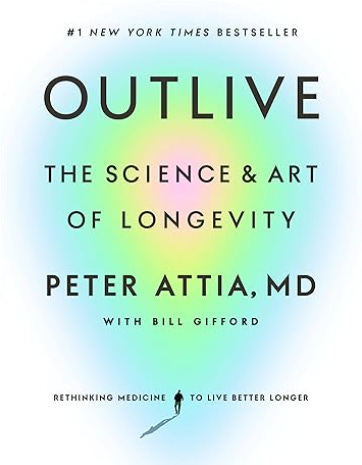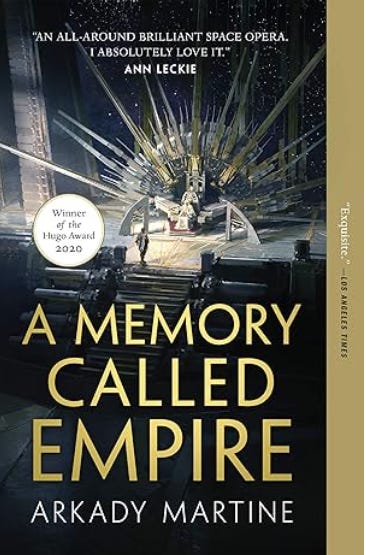The Ten Best Books I Read In 2024
Brief reviews of the best books I read this year, in no particular order.
The Counterpoint is a free newsletter that uses both analytic and holistic thinking to examine the wider world. My goal is that you find it ‘worth reading’ rather than it necessarily ‘being right.’ Expect monthly updates and essays on a variety of topics. I appreciate any and all sharing or subscriptions.
Children of Time by Adrian Tchaikovsky
It is always impressive when you read a book and you can tell that the author truly and deeply thought about the topics discussed in it. It’s another when that book also makes you feel empathy for spiders.
A team of scientists is preparing to release a genetically-designed nanovirus onto a terraformed exoplanet in the far reaches of our galaxy. The goal is to accelerate the neurological evolution of a group of soon-to-released monkeys. An unexpected terrorist attack releases the virus onto the planet, but not the monkeys.
Outlive by Peter Attia
I’ve spent my professional career working as a biomedical research scientist, working in a variety of areas such as immunology, cardiology, and even one of the prominent aging disorders (though it’s not actually aging). My two cents is that Outlive is the single best book on “aging” and how to live both a better and longer life.
This 500 page tome is both accessible yet detailed, enjoyable by both the lay person and scientist. It is filled with both practical advice and intricate science. Some highlights are the difference between strategy and tactics, the importance of both lifespan and healthspan, and a maniacal focus on the ‘Four Horsemen’ of human death (heart disease, cancer, neurodegenerative disease, and metabolic disease).
Seriously, this is not bluster: if you want to read a book about general health and aging, make it this one.
Barons by Austin Frerick
While ‘Big Tech’ and a few other industries draw all the anti-monopoly attention, unbeknownst to most, our food industry is one of the most consolidated and powerful industries in America. Clearly written and incredibly well-researched (~1000 citations), this book documents the "barons" of seven different food sectors (pork, grain, coffee, dairy, berries, slaughterhouses, and grocery stores) and how they've twisted them for their own profit, at the public's and environment’s expense.
Finding the Mother Tree by Suzanne Simard
Suzanne Simard is one of the scientific pioneers on that have uncovered how mycorrhizae fungi facilitate communication and interaction between the roots of trees and other plants. In this book, she tells the tale of both her life and work. As both a scientist and tree farmer, this book was “right up my alley,” as they say, while also giving some insight into this fascinating scientific niche.
A Memory Called Empire by Arkady Martine
When I brought this on our annual beach vacation, all I wanted was a fun and thrilling page turner that also made me think. And that’s exactly what I got.
When the new ambassador of a small but independent mining station in the far reaches of space arrives at the capital of the multi-system Texixcalaanli Empire, she discovers that the previous ambassador is dead, and the Empire is facing its most political instability in generations. What comes next is half murder mystery, half geopolitical chess moves with strong "undo the empire from the inside" vibes and lots of philosophy of language mixed in.
Wellness by Nathan Hill
Twenty years later, what started as a whirlwind romance in the 1990s Chicago art scene, turns into the drudgery of struggling suburban marriage. It explores the classic themes that you’d expect, such as parenting in the modern age, changing relationship dynamics, and suburban keeping-up-with-the-Joneses, but the semi-maximalist nature of the novel provides room for interesting asides on the ecology of American Prairie, the intertwining of rebellion and aesthetics, gentrification, physical fitness trends, toxic positivity, and the potential corrosiveness of social media.
I will mention that my cousin (hi Jenna!) started this book but disliked it so much that see stopped halfway through, so start at your own risk!

Red Rising (trilogy) by Pierce Brown
One of my oldest friends (hi John!) browbeat the entire high school friends group chat into reading this series. I’m glad he did.
I’m not going to defend these books as some high class literature, but they are better written that your classic ‘beach read.’ More importantly, they are some of the most page turning books I’ve ever read, constantly making me want to find out what comes next, while keeping me on my toes about what those events will be (seriously, there are so many points where you could not possibly guess what happens next). You can’t help buy fall in love with the protagonist, Darrow, as he struggles to take down the galactic empire from within, with interesting reflections on leadership, friendship, prejudice, capitalism, socialism, justice, and political corruption.
3 Shades Of Blue by James Kaplan
‘Kind of Blue’ is an album that is ingrained into the American mythos. You’ve have almost certainly heard, and probably recognize, multiple songs off it. Kaplan tells the tale of three very different men, Miles Davis, John Coltrane, and Bill Evan, and how the tapestry of their lives serendipitously wove together to create this album. Throughout, he also discusses the golden age of jazz, drug use, race, the music business, and touches on dozens of unknown-yet-world-class jazz musicians who helped build the most American genre of music.
Dwellers In the Land by Kirkpatrick Sale
John Wesley Powell is one of those Americans that more people should know. I mention him here because he was the second director of the U.S. Geological Survey, and in 1890, he proposed a radical policy: the states of the western United States should be determined by their watersheds (that map can be found here).
Powell’s plan is a quintessential example of the bioregionalism that Sale argues for in this book. Imagine a world structured around natural ecological boundaries, rather than national and political parameters. Sale presents this alternative way of organizing society (smaller scale, more ecologically sound, individually independent yet interdependent communities, with renewable economies and cultures that are more in touch with natural rhythms), and how it would respond and solve many present and impending ecological, economic, social, and spiritual crises.
While some of the specific examples and data felt somewhat dated, I found the higher scale meta discussion very much worthwhile. I even used the below quote in my “Steelmanning Degrowth: The Catalytic Society” post in October.
“It will take some time before people recognize that the project… is neither nostalgic nor utopian but rather the realistic sort of occupation anyone can participate in every day that has an immediate and practical chance of curbing our present waste and recklessness.” - Kirkpatrick Sale
Orfeo by Richard Powers
In each of the last four years, I have read one Richard Powers novel. First it was The Overstory, then Bewilderment, then The Echo Maker, and now Orfeo. Each one compelled me to read deeper into his catalog, and there will be no stopping next year. In Orfeo, when a retired music professor’s hobby microbiology lab draws the attention of Homeland Security, he flees cross-country reflecting through a fever-dream memory of his entire life.











